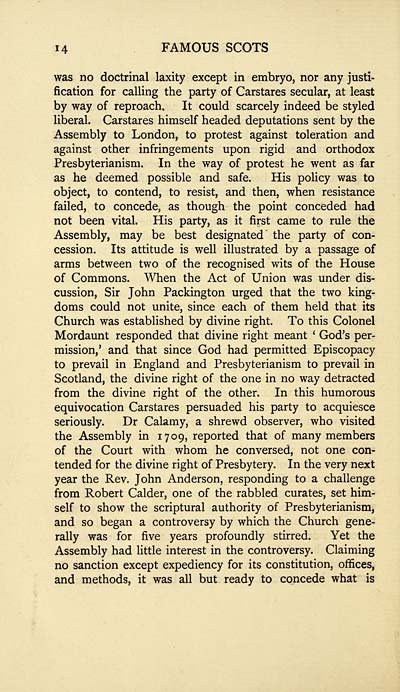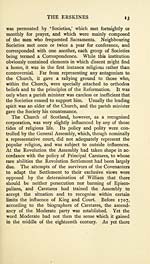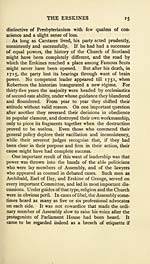Erskines
(18) Page 14
Download files
Complete book:
Individual page:
Thumbnail gallery: Grid view | List view

14 FAMOUS SCOTS
was no doctrinal laxity except in embryo, nor any justi-
fication for calling the party of Carstares secular, at least
by way of reproach. It could scarcely indeed be styled
liberal. Carstares himself headed deputations sent by the
Assembly to London, to protest against toleration and
against other infringements upon rigid and orthodox
Presbyterianism. In the way of protest he went as far
as he deemed possible and safe. His policy was to
object, to contend, to resist, and then, when resistance
failed, to concede, as though the point conceded had
not been vital. His party, as it first came to rule the
Assembly, may be best designated the party of con-
cession. Its attitude is well illustrated by a passage of
arms between two of the recognised wits of the House
of Commons. When the Act of Union was under dis-
cussion, Sir John Packington urged that the two king-
doms could not unite, since each of them held that its
Church was established by divine right. To this Colonel
Mordaunt responded that divine right meant ' God's per-
mission,' and that since God had permitted Episcopacy
to prevail in England and Presbyterianism to prevail in
Scotland, the divine right of the one in no way detracted
from the divine right of the other. In this humorous
equivocation Carstares persuaded his party to acquiesce
seriously. Dr Calamy, a shrewd observer, who visited
the Assembly in 1709, reported that of many members
of the Court with whom he conversed, not one con-
tended for the divine right of Presbytery. In the very next
year the Rev. John Anderson, responding to a challenge
from Robert Calder, one of the rabbled curates, set him-
self to show the scriptural authority of Presbyterianism,
and so began a controversy by which the Church gene-
rally was for five years profoundly stirred. Yet the
Assembly had little interest in the controversy. Claiming
no sanction except expediency for its constitution, offices,
and methods, it was all but ready to concede what is
was no doctrinal laxity except in embryo, nor any justi-
fication for calling the party of Carstares secular, at least
by way of reproach. It could scarcely indeed be styled
liberal. Carstares himself headed deputations sent by the
Assembly to London, to protest against toleration and
against other infringements upon rigid and orthodox
Presbyterianism. In the way of protest he went as far
as he deemed possible and safe. His policy was to
object, to contend, to resist, and then, when resistance
failed, to concede, as though the point conceded had
not been vital. His party, as it first came to rule the
Assembly, may be best designated the party of con-
cession. Its attitude is well illustrated by a passage of
arms between two of the recognised wits of the House
of Commons. When the Act of Union was under dis-
cussion, Sir John Packington urged that the two king-
doms could not unite, since each of them held that its
Church was established by divine right. To this Colonel
Mordaunt responded that divine right meant ' God's per-
mission,' and that since God had permitted Episcopacy
to prevail in England and Presbyterianism to prevail in
Scotland, the divine right of the one in no way detracted
from the divine right of the other. In this humorous
equivocation Carstares persuaded his party to acquiesce
seriously. Dr Calamy, a shrewd observer, who visited
the Assembly in 1709, reported that of many members
of the Court with whom he conversed, not one con-
tended for the divine right of Presbytery. In the very next
year the Rev. John Anderson, responding to a challenge
from Robert Calder, one of the rabbled curates, set him-
self to show the scriptural authority of Presbyterianism,
and so began a controversy by which the Church gene-
rally was for five years profoundly stirred. Yet the
Assembly had little interest in the controversy. Claiming
no sanction except expediency for its constitution, offices,
and methods, it was all but ready to concede what is
Set display mode to:
![]() Universal Viewer |
Universal Viewer | ![]() Mirador |
Large image | Transcription
Mirador |
Large image | Transcription
Images and transcriptions on this page, including medium image downloads, may be used under the Creative Commons Attribution 4.0 International Licence unless otherwise stated. ![]()
| Histories of Scottish families > Erskines > (18) Page 14 |
|---|
| Permanent URL | https://digital.nls.uk/95187294 |
|---|
| Description | A selection of almost 400 printed items relating to the history of Scottish families, mostly dating from the 19th and early 20th centuries. Includes memoirs, genealogies and clan histories, with a few produced by emigrant families. The earliest family history goes back to AD 916. |
|---|

